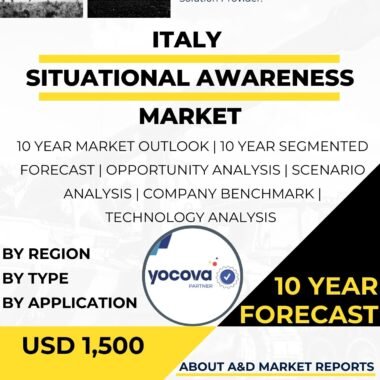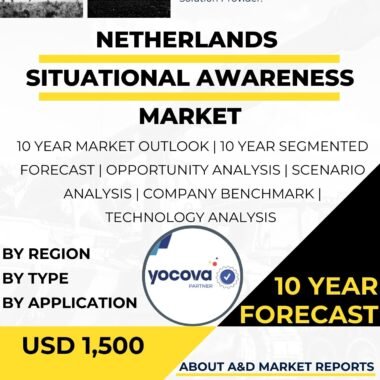Description
Saudi Arabia Antenna, Transducer and Radome Market
The Saudi Arabia Antenna, Transducer and Radome Market is a vital sector that focuses on the development, production, and distribution of various communication and sensing components for military, aerospace, and commercial applications. As a key player in the Middle East, Saudi Arabia recognizes the importance of advanced antenna systems, transducers, and radomes for communication, navigation, surveillance, and other critical operations. This article provides an overview of the country’s Antenna, Transducer, and Radome Market, including its current status, major players, applications, challenges, and future prospects.
Antennas are devices used to transmit and receive electromagnetic waves for communication, radar, and navigation systems. Transducers convert one form of energy to another, such as electrical signals to acoustic waves or vice versa. Radomes, short for radar domes, are protective coverings for antennas and transducers, designed to shield them from environmental elements without affecting their performance.
The Saudi Arabia Antenna, Transducer, and Radome Market play a pivotal role in supporting the communication and sensing needs of the country’s military, aerospace, and commercial sectors. The Saudi Arabian Armed Forces, as well as the civil aviation and telecommunications industries, rely on these components for critical operations and services.
The market encompasses both domestic production and the procurement of advanced technologies from international suppliers. The government of Saudi Arabia has made significant investments in developing its defense capabilities, aerospace industry, and telecommunications infrastructure, which drives the demand for advanced antenna, transducer, and radome technologies.
One of the major players in the Saudi Arabia Antenna, Transducer, and Radome Market is the Military Industries Corporation (MIC). As a government-owned defense company, MIC is responsible for the production and development of various defense-related products, including communication and sensing components. MIC’s role in domestic production aligns with the country’s efforts to develop its domestic defense industry and enhance self-sufficiency in critical technologies.
Additionally, partnerships with international defense and aerospace companies have contributed to the acquisition of advanced antenna, transducer, and radome technologies. These collaborations aim to enhance the capabilities of the Saudi Arabian Armed Forces and support the development of the domestic aerospace industry.
The applications of antennas, transducers, and radomes are diverse and cater to various industries in Saudi Arabia. In the military sector, these components are used in communication systems, radar systems, electronic warfare, and surveillance platforms. They enable secure and reliable communication, target tracking, and situational awareness for defense operations.
In the aerospace industry, antennas, transducers, and radomes play a crucial role in aircraft communication, navigation, weather radar systems, and satellite communication. They ensure seamless data transmission between aircraft, air traffic control, and ground-based systems, contributing to safe and efficient air travel.
Moreover, antennas and transducers have vital applications in the telecommunications industry. They are used in cellular networks, satellite communication, and wireless systems to enable data transfer and voice communication across the country.
The Saudi Arabia Antenna, Transducer, and Radome Market face several challenges. One primary concern is technological obsolescence and the need to continuously upgrade and modernize communication and sensing systems. As technology advances rapidly, the government must invest in research and development to stay abreast of the latest advancements and maintain a competitive edge in the market.
Another challenge lies in ensuring the reliability and performance of these components in extreme environmental conditions. Saudi Arabia features diverse landscapes, including deserts, coastal regions, and mountainous terrains, which present unique challenges for the operation of communication and sensing systems. Components must be designed to withstand sandstorms, high temperatures, and other environmental factors.
Additionally, the market’s self-sufficiency goals require significant investments in technology, infrastructure, and skilled human resources. Developing a robust domestic industry for antenna, transducer, and radome technologies requires partnerships with international firms for technology transfer, as well as the nurturing of local expertise and capabilities.
Furthermore, ensuring adherence to international standards and export regulations is crucial for Saudi Arabia’s engagement with foreign suppliers. Compliance with these regulations is essential to maintain the country’s reputation as a responsible actor in the global defense and aerospace industry.
Despite these challenges, the future prospects of the Saudi Arabia Antenna, Transducer, and Radome Market are promising. The government’s commitment to modernizing its defense capabilities, aerospace industry, and telecommunications infrastructure provides opportunities for growth in the market.
Advancements in antenna, transducer, and radome technology, such as phased-array antennas, metamaterials, and composite materials, offer opportunities to enhance the performance and capabilities of these components. Additionally, investments in research and development can lead to the development of indigenous technologies tailored to the country’s specific needs and environmental conditions.
Moreover, as the Saudi Arabian defense and aerospace industries continue to develop, there is potential for the growth of domestic manufacturing and support capabilities. Encouraging domestic industry development can lead to reduced reliance on foreign suppliers and enhance the country’s self-sufficiency in antenna, transducer, and radome technologies.
In conclusion, the Saudi Arabia Antenna, Transducer, and Radome Market are critical sectors that support the country’s communication, sensing, and aerospace needs. The government’s commitment to modernizing its defense capabilities, aerospace industry, and telecommunications infrastructure drives the market’s growth. Despite challenges, the future prospects of the market in Saudi Arabia are promising. As the country continues to invest in developing its defense and aerospace industries and advancing technology, antenna, transducer, and radome components will play a crucial role in supporting critical operations and services in the military, aerospace, and commercial sectors.




